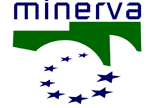| About Minerva | ||
| Structure | ||
| NPP | ||
| Good practises | ||
| Competence centres | ||
| Digitisation guidelines | ||
| Enlargement | ||
| Events | ||
| References | ||
|
Publications |
||
Firenze Agenda2nd draft - 17th October 2003
The Italian Presidency, the European Commission, the ERPANET and
MINERVA project are the promoters of this initiative in the philosophy
of eEurope and linked to the National Representatives Group. The
group of experts proposed an agenda with few, focussed objectives
in response to the challenges of preserving digital memory. The
focus addresses creation, preservation and access issues, including
both digitised and born-digital objects. And also respects the interests
of museum, libraries and archives, and the differences between media
format. The agenda covers a short period (12-18 months) identifying
concrete and realistic actions. This process is an open process
integrating on-going actions and voluntary efforts of the experts.
The experts have identified some initial responsibilities for each
of the action, and progress will be reviewed in one year during
the Dutch Presidency. The European Commission will submit the Firenze
agenda to the National Representatives Group at the next meeting
in Parma in November for endorsement and inviting each Member State
to support the initiative. Future Presidencies are invited to coordinate
the follow-up.
Action area 1: create awareness & cooperation mechanisms Community and consensus building is the first step. The initial focus is decision-makers. The expert group will work with user communities to capture their requirements and suggestions and develop suitable approaches to address those needs. They will build consensus beyond the current audience, towards professional bodies and establish cooperation with other initiatives in the field. The expert group will report regularly on progress and planning.
Actors: ERPANET and MINERVA projects as coordinators. ERPANET: coordination and web services for the expert group including forum, projects and literature assessment, the help-desk advisory service, erpaEprints; workshops on "trusted digital depositories" (Rome, November 2003); seminar on "scientific digital objects" (Lisbon, December 2003); publication of the workshops and seminars final reports. MINERVA: network of the national representatives for promotion and for data collection; workshops or seminars or events organisation on the field like Bibliocom on 30 October; NRG report by the end of 2003 including a slot to present progress of the initiative. DELOS: annual digital preservation summer school; annual state-of-the-art studies from the digital memory preservation cluster. PRESTOSPACE: workshops or seminars or events organisation on the field; annual state-of-the-art on digital preservation for audio-video archives. Workshop on "user requirements for audio-visual preservation", March 2004, Amsterdam.
Action area 2: exchange good practice & develop a common point of view Data collection on current practices, selection and promotion of good practice are necessary steps to re-use progress and to develop a common knowledge basis on suitable approaches and technologies. The focus here is to identify the missing 'bits'. Lessons already learned from examples of good practice must feed into tutorials and papers (e.g., on digital collections, trusted repositories, metadata, IPR, selection criteria, web archiving) and must be the basis for specifying a 'European interoperable platform'.
Actors: ERPANET and DELOS projects as coordinators. ERPANET: data collection and analysis to identify good practices: description and analysis of single and collective case studies and creation of erpatools; promotion of erpaAdvisory services; inform the preservation research agenda (see below). DELOS: continued review and coordination of the NSF/DELOS Digital Preservation and Archiving research agenda; studies and papers on the field; production of recommendations. DIGICULT FORUM: technology watch and tutorials on the field; contribution of technology specifications for a research agenda; creation of an 'Action in the Preservation of Memory' section in the Digicult.info Newsletter. PRESTOSPACE: technology specifications for a research agenda for audio and video archives; production of recommendations. Meeting in collaboration with the FIAT annual conference, on "technical specifications and system architecture for an audio-visual integrated preservation system", October 2004, Marseille. MINERVA: data collection infrastructure for accumulation of good practice experience; training trials on the longterm sustainability of digitised scientific and cultural objects in cooperation with ERPANET and DELOS.
Action area 3: long-term policies and strategies Lack of clear reference policies and responsibilities today is a serious risk in the future preservation of our memory. The expert group will stimulate the national/sectoral authorities to develop digital preservation policies, research/training programmes and trials as appropriate. In particular, the legal framework for electronic resources/records collections and deposits may be incomplete, not only for libraries and archives but also for e-government, for educational, for research and other environments of our information society. The adoption of a common agenda could be instrumental in catalysing national efforts on a coordinated framework at the European level and investment in collaborative public/private projects.
Actors: Italian and future Presidencies as coordinator. ITALIAN PRESIDENCY: developing the report on risks and emergencies with at least other four cases and the report on legislation and policy frameworks; implementing web site for the initiative and ensuring continuity in cooperation with the future Presidencies. PRESTOSPACE: Bridging the gap between technical results and service implementation, meeting in Paris, December 2004. ERPANET: Improving the understanding of the inter-connectedness between e-government and e-citizenship viability and the long term authenticity and integrity of digital entities; provide an annual review of national policies and strategies; enhance and promote policy and legal framework tools. |
|
Copyright Minerva Project 2003-12, last revision 2003-12-01,
edited by Minerva
Editorial Board. URL: www.minervaeurope.org/structure/nrg/documents/firenzeagenda031017draft.htm |
 |

